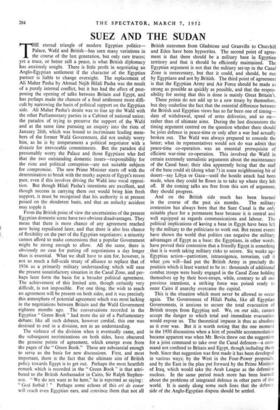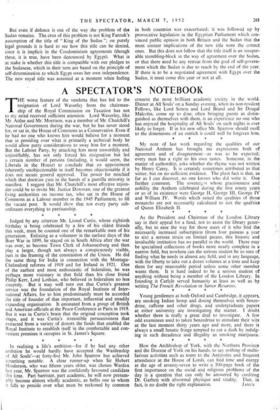SUEZ AND THE SUDAN
THE eternal triangle of modern Egyptian politics— Palace, Wafd and British—has seen many variations in the course of the last generation, but only rare truces; yet a truce, or better still a peace, is what British diplomacy has anxiously sought. There is little profit in negotiating an Anglo-Egyptian settlement if the character of the Egyptian partner is liable to change overnight. The replacement of Ali Maher Pasha by Ahmad Nejib Hilali Pasha was the result of a purely internal conflict, but it has had the effect of post- poning the opening of talks between Britain and Egypt, and has perhaps made the chances of a final settlement more diffi- cult by narrowing the basis of political support on the Egyptian side. Ali Maher Pasha's desire was to line up the Wafd with the other Parliamentary parties in a Cabinet of national union; the paradox of trying to preserve the support of the Wafd and at the same time pursuing an enquiry into the riots of January 26th, which was bound to incriminate leading mem- bers of the former Wafd Government, did not unduly worry him, as he is by temperament a political negotiator with a distaste for irrevocable commitments. But the paradox did presumably worry the Palace and those Egyptians who feel that the two outstanding domestic issues—responsibility for the riots and political corruption—are not suitable subjects for compromise. The new Prime Minister starts off with the determination to break with the murky aspects of Egypt's recent past, even if this involves driving the Wafd into vocal opposi- tion. But though Hilali Pasha's intentions are excellent, and though success in carrying them out would bring him fresh support, it must be recognised that his authority is at present poised on the slenderest basis, and that an unlucky accident may topple it From the British point of view the uncertainties of the present Egyptian domestic scene have two obvious disadvantages. They mean that there is more chance of any agreement reached now being repudiated later, and that there is also less chance of flexibility on the part of the Egyptian negotiators; a minority cannot afford to make concessions that a popular Government might be strong enough to allow. All the same, there is obviously no case for putting off negotiations a day longer than is essential. What we shall have to aim for, however, is not so much a full-scale treaty of alliance to replace that of 1936 as a primarily military understanding which will ease the present unsatisfactory situation in the Canal Zone, and per- haps later form the basis for a broader political agreement. The achievement of this limited aim, though certainly very difficult, is not impossible. For one thing, the wish to reach an agreement will be present on both sides, and it was precisely this atmosphere of potential agreement which was most lacking in the negotiations between Britain and the Wafd Government eighteen months ago. The conversations recorded in the Egyptian " Green Book " had more the air of a Parliamentary debate; like all such debates, however cordial, this one was destined to end in a division, not in an understanding.
The violence of the division when it eventually came, and the subsequent recriminations on both sides, have obscured the genuine points of agreement, which emerge even from the pages of the " Green Book." These are substantial enough to serve as the basis for new discussions. First, and most important, there is the fact that the ultimate aim of British policy towards Egypt is to get out. Perhaps the most heartfelt remark which is recorded in the " Green Book " is that attri- buted to the British Ambassador in Cairo, Sir Ralph Stephen- son. " We do not want to be here," he is reported as saying: " God forbid ! " Perhaps some echoes of this cri de coeur will reach even Egyptian ears, and convince them that not all British statesmen from Gladstone and Granville to Churchill and Eden have been hypocrites. The second point of agree- ment is that there should be a military base in Egyptian territory and that it should be efficiently maintained. The Egyptian argument is not that the military set-up in the Canal Zone is unnecessary, but that it could, and should, be run by Egyptians and not by British. The third point of agreement is that the Egyptian Army and Air Force should be made as strong as possible as quickly as possible, and that the respon- sibility for seeing that this is done is mainly Great Britain's.
These points do not add up to a new treaty by themselves, but they underline the fact that the essential difference between the British and Egyptian views has so far been one of timing— date of withdrawal, speed of arms deliveries, and so on— rather than of ultimate aims. During the last discussions the timing argument centred on the question whether there should be joint defence in peace-time or only after a war had actually broken out. The Wafd was always prepared to concede the latter-; what its representatives would not do was admit that peace-time co-operation, was an essential prerequisite of efficient war-time co-operation. This involved the Wafd in certain extremely unrealistic arguments about the maintenance of the Canal base; their idea apparently being that the staff of the base could sit (doing what ?) in some neighbouring bit of desert—say Libya or Gaza—until the hostile attack had been made, when they could be flown in to take up where they left off. If the coming talks are free from this sort of argument, they should progress.
And on the British side much has been learned in the course of the past six months. The military contention has always been that the Suez Canal is the only suitable place for a permanent base because it is central and well equipped as regards communications and labour. The political implications of having a base in Egypt have been left by the military to the politicians to work out. But recent events have shown the world that politics can negative the military advantages of Egypt as a base; the Egyptians, in other words, have proved their contention that a friendly Egypt is something that it is worth taking military risks to secure. Six weeks ago Egyptian action—patriotism, intransigence, terrorism, call it what you will—had put the British Army in precisely the position which it least wanted to be in : thousands of additional combat troops were busily engaged in the Canal Zone holding themselves up by their boot-straps, while, contrary to all our previcius intentions, a striking force was poised ready to enter Cairo if anarchy overcame the capital.
This is the situation which must never be allowed to occur again. The Government of Hilali Pasha, like all Egyptian Governments, is anxious to secure the total evacuation of British troops from Egyptian soil. We, on our side, cannot accept the danger to which total and immediate evacuation would expose us. The theoretical impasse is thus as absolute as it ever was. But it is worth noting that the one moment in the 1950 discussions when a hint of possible accommodation became apparent was when Mr. Bevin threw out the suggestion for a joint command to take over the Canal defences—a com- mand not confined to Britain and Egypt, though including them both. Since that suggestion was first made it has been developed in various ways; by the West in the Four-Power proposals, and by the East in the plan put forward by the Prime Minister of Iraq, which would take the Arab League as the defensive nucleus. In the same period much more has been learned about the problems of integrated defence in other parts of the world. It is surely along some such lines that the defence side of the Anglo-Egyptian dispute should be settled. But even if defence is out of the way the problem of the Sudan remains. The crux of this problem is not King Farouk's assumption of the title of " King of the Sudan "; on purely legal grounds it is hard to see how this title can be denied, since it is implicit in the Condominium agreements (though these, it is true, have been denounced by Egypt). What is at stake is whether this title is compatible with our pledges to the Sudanese, which in their turn are based on the principle of self-determination to which Egypt owes her own independence. The new royal title was assumed at a moment when feeling in both countries was exacerbated; it was followed up by provocative legislation in the Egyptian Parliament which con- vinced public opinion in both Britain and the Sudan that the most sinister implications of the new title were the correct ones. But this does not follow that the title itself is an insuper- able stumbling-block in the way of agreement over the Sudan, or that there need be any retreat from the goal of self-govern- ment which the Sudan is due to reach by the end of the year. If there is to be a negotiated agreement with Egypt over the Sudan, it must come this year or not at all.



































 Previous page
Previous page